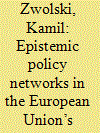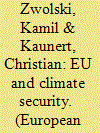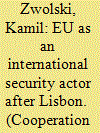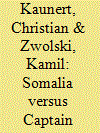|
|
|
Sort Order |
|
|
|
Items / Page
|
|
|
|
|
|
|
| Srl | Item |
| 1 |
ID:
137420


|
|
|
|
|
| Summary/Abstract |
This paper offers insights into an innovative and currently flagship approach of the European Union (EU) to the mitigation of chemical, biological, radiological, and nuclear (CBRN) risks. Building on its long-time experience in the CBRN field, the EU has incorporated methods familiar to the students of international security governance: it is establishing regional networks of experts and expertise. CBRN Centers of Excellence, as they are officially called, aim to contribute to the security and safety culture in different parts of Africa, the Middle East, South East Asia, and South East Europe, in the broadly construed CBRN area. These regional networks represent a modern form of security cooperation, which can be conceptualized as an epistemic policy networks approach. It offers flexibility to the participating states, which have different incentives to get involved. At the same, however, the paper identifies potential limitations and challenges of epistemic policy networks in this form.
|
|
|
|
|
|
|
|
|
|
|
|
|
|
|
|
| 2 |
ID:
103195


|
|
|
|
|
| Publication |
2011.
|
| Summary/Abstract |
This article analyses the development of the European Union (EU) as a global actor in the area of climate security. Building on this, it explicitly draws on constructivist concepts such as norm entrepreneurship and epistemic communities. To this end, it adopts the framework of epistemic communities, as developed by Peter Haas, in order to suggest that there is a group of EU officials, EU member states and think-tank activists, who drive the climate security agenda of the EU. Thus, it examines the precise actors involved in this EU epistemic community for climate security. This group promotes a reason for action at the global level, resulting in the attempt to diffuse this norm: climate change has consequences for international security; thus, it requires the development of appropriate policies and capabilities within the EU and globally. This article suggests that the epistemic community on climate security has been effective at diffusing this norm at both levels, albeit with differences.
|
|
|
|
|
|
|
|
|
|
|
|
|
|
|
|
| 3 |
ID:
112412


|
|
|
|
|
| Publication |
2012.
|
| Summary/Abstract |
This article argues that a holistic approach is important when studying the European Union's (EU) role as an international security actor, but at the same time it identifies problems in adopting such a comprehensive research agenda. The holistic approach entails that the research must include 'new' security problems, such as climate change, but also relevant policies and instruments outside the framework of the Common Security and Defence Policy (CSDP). However, owing to conceptual, legal and political obstacles, this has been difficult to achieve; as a consequence, existing research on the EU as an international security actor tends to narrow down the focus to just one framework: the CSDP and its operations. This may lead to a distorted image, because the EU's role in international security surpasses any single policy framework. The contribution of this article is twofold. First, it sets the framework for the comprehensive research agenda concerning the EU as an international security actor. Second, it identifies key obstacles that are making this holistic approach methodologically and conceptually difficult. In this context, the Lisbon Treaty, formally abandoning the pillar structure of the EU, provides an opportunity to mitigate at least some of these roadblocks.
|
|
|
|
|
|
|
|
|
|
|
|
|
|
|
|
| 4 |
ID:
153376


|
|
|
|
|
| Summary/Abstract |
Following its 2015 parliamentary and presidential elections, Poland has reversed its consistently pro-European foreign policy, marking a radical departure from its post-1989 course. Whether this turn is the result of some well-developed strategy, or merely a natural extension of illiberal domestic reforms introduced by the new government, is irrelevant.1 What matters is the outcome. Poland is no longer an engine of European integration, nor does it seem to value its relationships with Germany and France. Instead, the new government has pledged to revive an interwar alliance of central and eastern European (CEE) states, which Poland, as the largest country of that region, would naturally lead. To justify this revolution, it has deployed the familiar claim that Poland must protect its sovereignty and national interest against Brussels and Berlin. In particular, Poland must defend itself against the European Union’s (EU) unchristian, liberal values; against German economic domination; and against being forced to accept migrants and refugees professing non-Christian faiths.
|
|
|
|
|
|
|
|
|
|
|
|
|
|
|
|
| 5 |
ID:
134279


|
|
|
|
|
| Summary/Abstract |
An internal security problem of Somalia—state failure from internal conflict resulting in increased piracy—has increasingly become an external security problem for the European Union (EU). This article contributes to analysing the role of the EU as a security actor in countering piracy off the Horn of Africa, by examining three different dimensions of the EU response to this problem: (a) the immediate EU response (the EU military mission EUNAVFOR Atalanta); (b) the medium-term EU response (the Critical Maritime Routes (CMR) programme launched by the European Commission); and (c) the long-term EU response (development and security assistance). This article concludes that the EU has been very active in addressing piracy through its naval task-force to protect maritime transport in the western Indian Ocean and the Gulf of Aden, as well as its efforts to enhance regional counter-piracy capacities and thematic and geographical financial instruments. The EU thus has taken up the fight against ‘Captain Hook’.
|
|
|
|
|
|
|
|
|
|
|
|
|
|
|
|
|
|
|
|
|